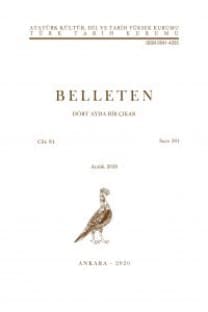Türk Filozofu Farabi ve Düşüncesi
Farabi'nin dedesinin adı Uzluk, babasının adı Tarhan'dır. Ayrıca O, Türklerin oturduğu bölgede dünyaya gelmiştir. Kaynaklarda kendisinden, al-Feylesof at-Türkî diye söz edilir. Maveraünnehir'de Farab ilinin Vesic köyünde H. 257 / M. 870 yılında doğmuştur. Bir süre Merv'de tahsil görmüştür. Daha sonra Bağdat'ta, Harran'da ve Şam'da dolaşmıştır. Felsefe öğrenimini Bağdat'ta iken Ebu Bişr Metta b. Yunus'tan ders alarak geliştirmiştir. Ayrıca Harran'da Yuhanna b. Haylan'dan mantık ve felsefe dersi aldı. Daha sonra Halep ve Şam dolaylarının Sultanı olan Seyf ad-Devle'nin çağrısı üzerine Şam'a yerleşti. Birçok dil biliyordu. Çok zeki ve çalışkan bir insandı. Zamanında felsefe, mantık, psikoloji, musiki, matematik ve tıpta büyük bir bilgin olarak tanındı.
The Role of Christian Minorities in Efforts by the Great Powers to Dismember the Ottoman Empire
When the Turks made the fateful decision of embracing Islam as their religion, they became a marked people in the eyes of the Christian World, which saw that religion as a great danger to its very existence. The Turks failure, or refusal, to accept Christianity, despite the efforts of Pope Pius II, did not endear them to the Christians of the West; nor did their contribution to the Muslim cause during the great politico-religious upheaval of the Crusades. These religious wars created bitterness, hatred and hostility between Islam and Christianity, which were to last for centuries. Christendom saw Islam as a deviance, a bogey, which, it believed, aimed at eradicating the Christian heritage; and therefore the Ottoman Turks, who had espoused the cause of Islam by taking over the Caliphate, became the object of that Christian hatred and hostility.
Keywords:
Ottoman Empire, Christianity, Turks, Islam, History,
- ISSN: 0041-4255
- Yayın Aralığı: 3
- Başlangıç: 1937
- Yayıncı: Türk Tarih Kurumu
Sayıdaki Diğer Makaleler
Türk Filozofu Farabi ve Düşüncesi
Fatih'in Trabzon'u Fethi Öncesinde Osmanlı-Trabzon-Akkoyunlu İlişkileri
XV. Yüzyılda Osmanlı Devleti-Milano Duka'lığı İlişkileri
Richard G. Hovannisian on Lieutenant Robert Steed Dunn
Ölümünün 1250. Yıldönümü Münasebetiyle Bilge Kagan
